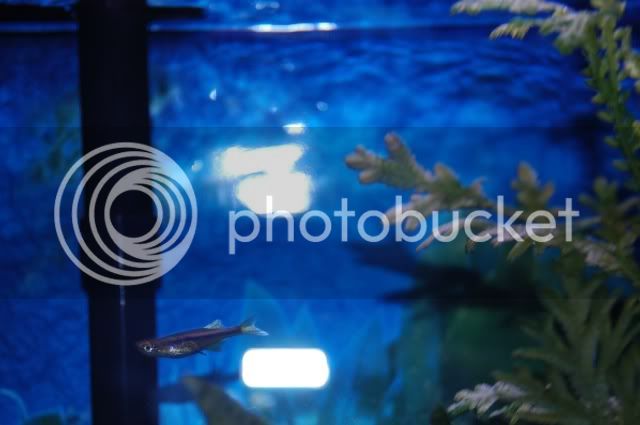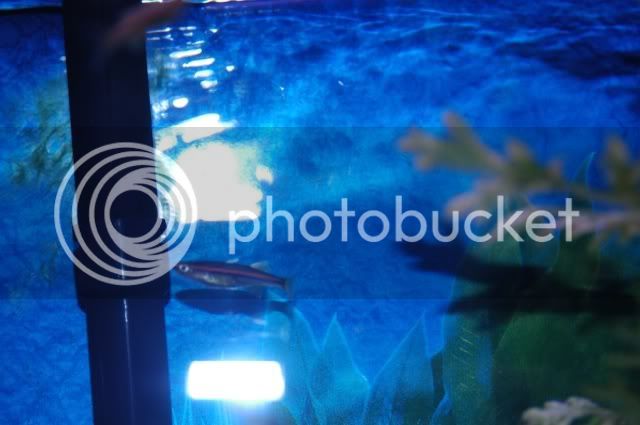fuzz16 wrote:
You never said how you acclimated the fish.
Also, the danios could have stressed gourami to death.
Could be for many reasons it died, but mostly the cause was stress of shipment the store. Less likely your fault if your tank is within conditions
^This.
Gouramis die very easily. They are slow moving fish (unless startled in which they can move fast but this is bad if you see this a lot) where as danios never stop moving and can be aggressive feeders. While they may not have gone after the Gourami, just their activity can stress a Gourami that had been poorly taken care of (by the store) out badly. They are also air breathers...was the top of the tank well ventilated? While the 8.2 pH is higher, Gouramis can do fine in it if acclimated properly...however, a pH change of as little as .2 can send some fish into shock hence the importance of the acclimation. However, if your store was local, the pH was likely the same as big box stores rarely treat their water with anything but the basic dechlorinator. Most likely this was the big box store's fault as Gouramis are VERY easily stressed to death. They take awful care of their fish in both the shipping process and the care process, and they use community filters that leads to the spread of the disease. The astronomical amount of stress they place on these fish in itself can send them into terminal shock. If not, it frys their immune system leaving them vulnerable to disease. Casualty rates for Gouramis are around 50% even before they make it to the owner. The ones which do make it to owners are in rough shape from the start and many are very, very sick. I would personally only buy fish from a trusted and reputable local store, especially the more fragile fish. They are more humane, they know more, they take pride in their livestock, they stand behind their product, and they can give you useful advice, such as what their water stats are. When buying new fish, ALWAYS ask for water parameters on their own water. Then you already know the pH difference and can plan accordingly in how to match it (I kept my pH at 6.8 with Gouramis when I had them). Furthermore, if they test it in front of you and get high ammonia, nitrite, or nitrate readings, or a pH which is wayyyy off for that fish, don't buy it as it is likely stressed. If the parameters look good, then the fish is likely a better, healthier one to buy.
As far as the danios seeming to have contracted a disease, this is where the importance of a quarantine tank comes into play. That Gourami had been exposed to literally thousands of other fish, as big box stores and factory farms use community water, which means one massive filter can power 20, 100, or more tanks all packed to the brim with fish. If just one was sick, the Gourami could have contracted it. Given they are known to eat dead fish, this increases this chance. If you put a fish that is possibly sick in your main tank, then you could risk wiping out your entire tank in as little as a few days. You don't know how healthy the fish is by just looking at it so you need to quarantine it for a week or so to observe it and be sure it does not die or get sick. Don't let the water, nets, decorations, or anything else mix between the two tanks. Assume any new fish is potentially diseased and handle it accordingly. Also, by isolating the fish in its own tank, you have immediately reduced its stress by not having it actively compete with other fish for food and territory. Therefore, if the fish is stressed or sick, you boost its recovery in itself.
As for the parasite medication for the danios, they are about the hardiest fish on the planet. Levamisole will work fine (although note that I do NOT recommend using it for ALL fish). The cheapest thing it can be found in is Jungle Anti Parasitic Medicated Fish Food, which is pretty good stuff for the price. Garlic can also exert some antiparasitic action and stimulate appetite, although I doubt appetite will be a problem given they are danios.
Finally, do not overlook the importance of trace elements in food. Fish are not that different from people in the respect that we both need certain (but different) vitamins and minerals to thrive. Without them, we are at greater risk to injury and disease, and our life span can even be shortened. High quality foods, such as New Life Spectrum or Hikari (among others) contain the elements fish need to thrive where as many lesser foods simply do not (many cheap foods have the main ingredient of a corn or flour based product). A high quality food in itself can help reduce stress and certainly boosts the immune system, helping to prevent diseases outright. Again, this is why big box stores should be avoided, as they often use cheap quality flakes instead of high quality pellets (flakes are bad because fish often go to the top and 'gulp' in air which can screw up the swim bladder).











































































